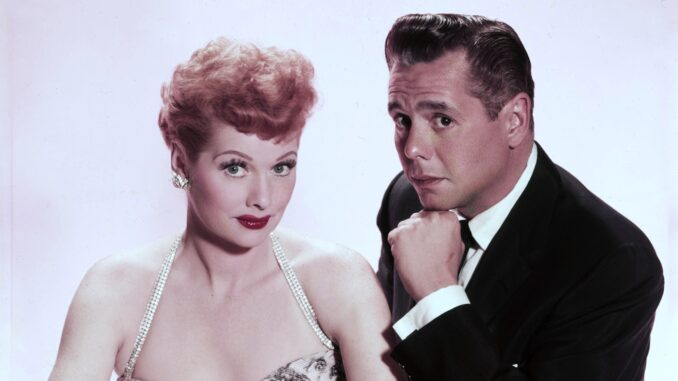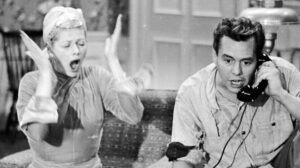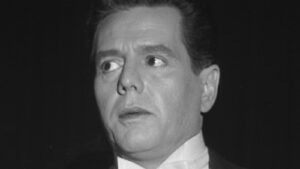
Introduction: The Power Couple That Changed TV Forever
When you think of classic television, I Love Lucy instantly comes to mind. The groundbreaking sitcom didn’t just deliver laughs; it redefined how America viewed marriage, comedy, and even diversity. But have you ever wondered why Desi Arnaz, a Cuban musician, landed the role of Ricky Ricardo? Was it luck, talent, or something more strategic? Let’s dive into the fascinating backstory of how Desi Arnaz became an integral part of TV history.
Lucille Ball and Desi Arnaz: A Match Made in Hollywood
Long before I Love Lucy, Lucille Ball and Desi Arnaz were already a power couple. Their love story began in 1940 when they met on the set of the movie Too Many Girls. Sparks flew, and they married later that year. But their personal chemistry wasn’t the only reason Desi Arnaz became Lucy’s on-screen partner.
A Real-Life Marriage to Reflect on Screen
In an era when television often leaned on idealized versions of American life, Ball and Arnaz wanted to bring authenticity. Their real-life marriage added a layer of believability to Lucy and Ricky’s relationship, making the show relatable to millions of viewers.

CBS Was Initially Skeptical
Interestingly, Desi Arnaz wasn’t CBS’s first pick. In fact, network executives had major doubts about casting a Cuban-American actor as the lead in a primetime sitcom. They believed the American audience wouldn’t accept an interracial couple on screen.
Breaking Stereotypes and Shattering Barriers
Desi’s ethnicity and accent were considered risky for the 1950s conservative audience. Yet, Lucille Ball stood her ground. She knew their chemistry couldn’t be replicated and insisted that Desi be cast. She even rejected initial offers for a radio show to ensure they could co-star together on television.
Desi Arnaz’s Business Savvy Sealed the Deal
Beyond his charm and acting skills, Desi Arnaz brought a level of business acumen that CBS couldn’t ignore. He wasn’t just another actor; he was a visionary who understood the mechanics of show business.

The Birth of the Multi-Camera Sitcom
Did you know Desi Arnaz was instrumental in introducing the multi-camera setup still used in sitcoms today? He advocated for filming in front of a live audience to capture authentic reactions, a move that revolutionized television production.
Lucille Ball’s Career Reinvention
Lucille Ball was already a star, but her career was at a crossroads. After years of starring in B-movies, she needed a project that would showcase her comedic genius. Pairing with Desi Arnaz gave her the perfect platform to reinvent herself.
A Partnership Built on Mutual Respect
Their dynamic wasn’t just about love; it was about mutual respect and trust. Desi believed in Lucy’s talent, and she valued his innovative ideas. Together, they created a show that would become a cultural phenomenon.
The Studio Audience Test That Changed Everything
Before CBS greenlit the show, Lucille and Desi took their act on the road. They performed a vaudeville-style comedy routine to gauge audience reactions. The response was overwhelmingly positive, convincing CBS to take a chance on the couple.
Ricky Ricardo Was Tailor-Made for Desi Arnaz
The character of Ricky Ricardo wasn’t just a convenient fit; it was specifically designed with Desi in mind. His background as a bandleader seamlessly aligned with Ricky’s storyline, allowing Desi to showcase his musical talent while acting.
Music: A Core Element of the Show
Desi’s musical interludes became a staple of I Love Lucy, adding an extra layer of entertainment. His performances were more than just filler; they highlighted his charisma and deepened his connection with the audience.
The Risk That Paid Off
Casting Desi Arnaz was a gamble, but it paid off in spades. I Love Lucy premiered in 1951 and quickly became the most-watched show on television. It broke viewership records and won numerous awards, solidifying its place in TV history.
How Desi Arnaz Redefined the Role of a Sitcom Husband
Unlike the passive, often clueless husbands portrayed in other sitcoms of the era, Ricky Ricardo was a strong, assertive character. He matched Lucy’s antics with his own flair, creating a balanced comedic dynamic.
A Revolutionary Portrayal of Marriage
Their on-screen relationship broke new ground by portraying a more equal partnership. Ricky wasn’t just a foil for Lucy’s schemes; he was her partner in crime, navigating the ups and downs of marriage with humor and heart.
Desi Arnaz’s Influence on Future Generations
Desi’s groundbreaking role paved the way for greater representation of Hispanic actors in Hollywood. He showed that talent transcends cultural and racial boundaries, inspiring countless others to follow in his footsteps.
Conclusion: A Legacy That Lives On
Desi Arnaz wasn’t just cast in I Love Lucy; he helped create a television legacy that continues to inspire generations. His unique blend of talent, charisma, and business acumen made him irreplaceable. Together, Lucille Ball and Desi Arnaz didn’t just entertain—they transformed the landscape of American television forever.
FAQs
1. Why did Lucille Ball insist on casting Desi Arnaz?
Lucille Ball believed their real-life chemistry would translate well on screen, and she wanted to work alongside her husband to maintain their personal relationship.
2. What challenges did Desi Arnaz face as a Cuban actor in Hollywood?
Desi faced skepticism from network executives who doubted an American audience would accept a Cuban actor in a lead role. However, his talent and charm quickly won over viewers.
3. How did Desi Arnaz change television production?
Desi introduced the multi-camera setup and live audience format, which became standard in sitcom production, revolutionizing how TV shows were filmed.
4. Was I Love Lucy successful right away?
Yes, the show was an instant hit, quickly becoming the most-watched program on television and setting viewership records.
5. What is Desi Arnaz’s lasting impact on Hollywood?
Desi Arnaz broke racial barriers, pioneered innovative production techniques, and paved the way for greater diversity in television. His contributions remain influential to this day.